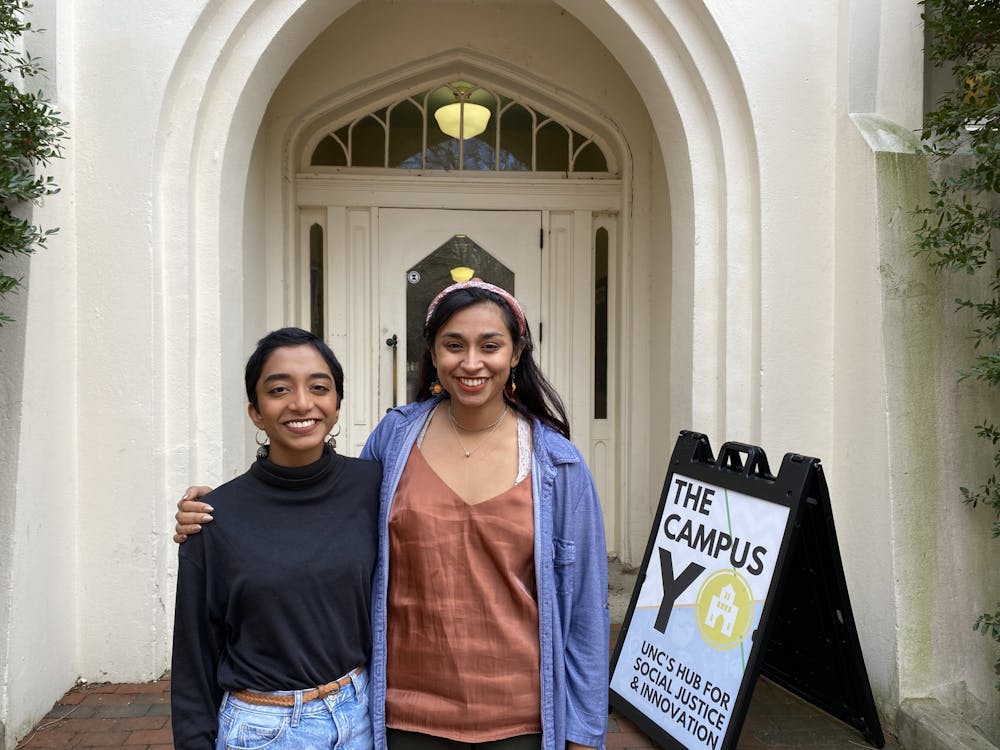And, ideally, this would be something that student government and the executive branch of student government would participate in as well. That’s something that we definitely want to make happen — I think, just like, bringing leadership together is a really, really powerful way to best advocate and organize for student needs on this campus, particularly the needs of marginalized students.
TW: Yes, so the next one is restorative spaces. And so we’ve identified a really dangerous culture at the Y and also at UNC in general. I think that we as students see our bodies as machines to produce work and a lot of our self-worth is attached to that, but at the end of the day, we’re living and we’re breathing and we're daughters and we’re friends. We need to be able to engage in other aspects of our lives, and we want to facilitate that as leaders primarily by example ...
VP: Our next one is fostering solidarity. And this builds on the idea of prioritizing marginalized voices mainly in recognizing that it’s one thing to have everybody together in a room at the same table — and that’s a big component of our platform, like, "a place at the table," but another part of that ... is recognizing that we all have a collective stake in the issues that we are seeking to solve and in the communities we are seeking to serve.
TW: Another thing that we’re doing is we’ll be inviting CARS members and also one member of the committee to bi-weekly meetings at our house, our cabinet. The purpose behind that is — it’s a weekly executive board meeting, we’ll also be having a potluck, breaking bread with people, which I think is really powerful, and it fosters a sense of community
VP: Community — sort of, deliberate celebrations of each other and uplifting each other — lifting each other is one of our values ...
TW: The next one is accessibility and education. This is multi-pronged, so we’re talking about accessibility and education within the executive board, within faculty in the executive board, cabinet and then the greater UNC community ...
VP: We want people to engage. We know that there’s this high perceived barrier to entry within the community.
A lot of students of color come into this space and feel like their lived experiences are not enough for them to engage with the issues that we talk about which should not be the case at all. And so we understand the role that using somewhat unaccessible language plays in these spaces.
We also want to give credit where credit is due in terms of honoring the roots of a lot of these academic theories. A lot of this language, it comes from the work of marginalized scholars, scholars of color. And so, also just remembering to draw the roots of these theories in the lived experiences of scholars of color who have contributed their time and their effort to this work and thus making this work more accessible.
We hope by making those connections more clear, and by also just providing the means for people to educate themselves, we can sort of break down those perceived barriers to participation within the Y.
Practicing ethical service is the final component of our visions and this is really rooted in our experience because the primary component of our experience at the Y has been domestic and global service.
We want people to examine the reasons why they serve. This entails a lot of self-reflection. It also looks like education ... in the form of bringing in facilitators who can educate us, often from these communities themselves who can talk about their lived experiences and figure out ways to move collaboratively forward.
To get the day's news and headlines in your inbox each morning, sign up for our email newsletters.
And by sustainability, we want to work alongside communities to create changes in structures that will continue positive change and fill in the gaps even in the hypothetical absence of student involvement. So we don’t want student volunteers, volunteers who serve to be this continuous crutch for these communities. We want them to be autonomous and sustainable. And this also looks like just recognizing the inherent wholeness and dignity of everybody, especially within the communities that we serve.
And in terms of concrete strategies, we plan on adding a domestic counterpart to the global amendment in our constitution that outlines ethical ways of serving domestically.
And we want to collaborate with Carolina Public Service Scholars. They conduct a survey with a lot of the various organizations, various nonprofits in communities that students tend to serve at about the effectiveness of service and what we can do better. And so, they bring a lot of valuable feedback that we want to be able to access and utilize to better our own experiences with service and better our own involvement.
DTH: If you could sum up your campaign and what you’re all about in a sentence or two and what you want the student body to know about the essentials of who you are, what would you say?
TW: I think what we’re really all about is that we don’t want to talk for people, we want to uplift them. We want to learn from them, hear them, and then we want to respond in an effective and sustainable way.
VP: Absolutely. And I think that really also encompasses the name of our campaign, "Place at the Table." It’s not about speaking on behalf of other students, particularly marginalized students leaders and student communities, it’s about offering them the space and recognizing the inherent privilege and standing that the Y has as a historic institution, as a predominantly white institution, and utilizing the power that exists within the Y — the privilege that exists within the Y — to open up a space for student involvement for everyone else.
university@dailytarheel.com




